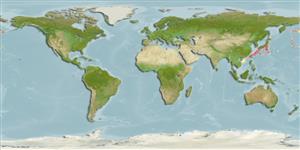>
Ophidiiformes (Cusk eels) >
Ophidiidae (Cusk-eels) > Neobythitinae
Etymology: Porogadus: Greek, poros = porous + Latin, gadus = a fish, cod? (Ref. 45335); guentheri: Named for Dr. Albert Günther.
Eponymy: Dr Albert Karl Ludwig Gotthilf Günther (1830–1914) was a German-born British zoologist, ichthyologist and herpetologist. [...] (Ref. 128868), visit book page.
More on authors: Jordan & Fowler.
Environment: milieu / climate zone / depth range / distribution range
Ecologia
marino batidemersale; distribuzione batimetrica 805 - 1530 m (Ref. 34024). Deep-water
Northwest Pacific: Japan and the East China Sea.
Size / Peso / Age
Maturity: Lm ? range ? - ? cm
Max length : 21.0 cm SL maschio/sesso non determinato; (Ref. 559)
Short description
Chiavi di identificazione | Morfologia | Morfometria
This species is distinguished by the following characters: precaudal vertebrae 16-17; first gill arch with long gill rakers 18-21, broad, bladed; HL:HD 1.71-1.79; most head spines are strong: on ethmoidal, prefrontal, interorbital, supraorbital, sphenotic, supratemporal, inner and outer posttemporal, inner preopercular rim, lacrimal with ridge, and weak on outer preopercular rim, absent on 5th infraorbital; opercular spine is sharp, extruding; maxilla with single row of scales along upper margin in front of supramaxilla; the large opercular flap with ridges; lower lateral line pores until beginning of anal fin 16; narrow dentition patch on vomer with few or 1-2 (rarely 3) rows of teeth; palatines with moderately broad dentition patch (3-6 rows of teeth); otolith with single colliculum but indentation at ventral margin and rarely separate colliculi; OL:OH = 1.45-1.64; OL:TCL = 1.87-2.52 (Ref. 125143).
A benthopelagic species at bathyal depth (Ref. 56809). Uncommon species (Ref. 34024). Oviparous, with oval pelagic eggs floating in a gelatinous mass (Ref. 205).
Life cycle and mating behavior
Maturità | Riproduzione | Deposizione | Uova | Fecundity | Larve
Schwarzhans, W.W. and P.R. Møller, 2021. Revision of the ‘dragon-head’ cusk eels of the genus Porogadus (Teleostei: Ophidiidae), with description of eight new species and one new genus. Zootaxa 5029(1):001-096. (Ref. 125143)
IUCN Red List Status (Ref. 130435: Version 2024-2)
Threat to humans
Harmless
Human uses
Pesca: di nessun interesse
Strumenti
Special reports
Download XML
Fonti Internet
Estimates based on models
Preferred temperature (Ref.
123201): 3.3 - 4.9, mean 4.3 °C (based on 37 cells).
Phylogenetic diversity index (Ref.
82804): PD
50 = 0.5001 [Uniqueness, from 0.5 = low to 2.0 = high].
Bayesian length-weight: a=0.00110 (0.00040 - 0.00297), b=3.08 (2.85 - 3.31), in cm total length, based on LWR estimates for this (Sub)family-body shape (Ref.
93245).
Trophic level (Ref.
69278): 3.5 ±0.6 se; based on size and trophs of closest relatives
Resilienza (Ref.
120179): Medio, tempo minimo di raddoppiamento della popolazione 1.4 - 4.4 anni (Assuming tmax>3).
Fishing Vulnerability (Ref.
59153): Low vulnerability (16 of 100).
